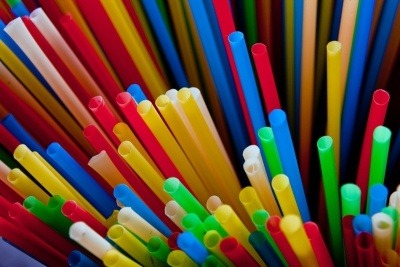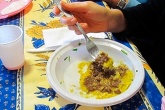EU proposes single-use plastic bans to combat marine litter
The European Commission (EC) has proposed a full ban on some of the most commonly used and littered disposable plastic products in Europe, including single-use cutlery, plates, drinks stirrers, straws, cotton buds and sticks for balloons.
The draft Single-Use Plastics Directive, announced on Monday (28 May), proposes measures covering a range of items which constitute the most common sources of marine litter in Europe, including 10 single-use plastic products.

Measures range from outright bans on single-use plastic items to producer obligations, labelling requirements and national reduction and collection targets, with €100 million (£87 million) to be devoted to financing these actions between now and 2020. The proposals come as part of the wider European Plastics Strategy, the content of which was agreed by Europe’s environment ministers in March and which focuses on creating a more circular plastics economy in the EU, aiming to improve design for recyclability and boost demand for recycled plastic.
The Commission is aiming to reduce marine litter by ‘more than half’ by 2030 for the single-use items, while investing in innovative alternatives, which it claims will create around 30,000 new jobs.
If accepted by the European Parliament and Council, there will be a ban introduced across the EUon plastic cotton buds, cutlery, cutlery, plates, drinks stirrers, straws and sticks for balloons, with producers required to use recyclable and sustainable alternative materials.
Such a ban at the EU level would remove the uncertainty regarding whether national bans on single-use plastic products contravene the rules of the Single Market and the free movement of goods, capital, services and labour. This issue was brought to the fore when a law passed by the French Government in August 2016, requiring disposable plastic plates, cutlery and cups to be suitable for home composting by 2020, led to threats of legal action by Pack2Go, an organisation representing European packaging manufacturers, which claimed that the law was in violation of EU rules on the free movement of goods.
The implementation of an EU-wide ban would pave the way for the UK and its devolved governments to introduce national bans without fear of going against the rules of the Single Market. Although the UK is set to leave the EU, the government has confirmed that it will be beholden to the EU’s Circular Economy Package and, depending on what kind of post-Brexit deal the UK negotiates with the EU, if any, there may be a large amount of regulatory alignment between the UK and EU – this could have thrown up trade complications in the event that the UK attempted to introduce a national ban while such a ban remained absent in the EU.
EU-wide targets
Alongside the proposed bans, the proposed European Directive will contain requirements for EU member states to reduce their consumption of single-use food containers and beverage cups, the latter being a growing issue in the UK, where only 0.25 per cent of all coffee cup waste is recycled each year. A number of businesses, including Costa Coffee and packaging company DS Smith, have announced plans to increase their recycling of these mixed-material items, but the EU measures are focused on moving up the waste hierarchy from recycling towards the minimisation and prevention of waste in the first place.
Members will also be required to collect 90 per cent of single-use plastic drinks bottles for recycling by 2025, potentially a tall order considering that in the UK just over 50 per cent of the 13 billion bottles sold each year are recycled. However, the introduction of a deposit return scheme (DRS) in the UK, slated for approval by 2020, could lead to an increase in recycling rates; Germany introduced a DRS for beverage containers in 2003 and saw recycling shoot up to its current rate of 98.5 per cent, the highest in the world.
Jyrki Katainen, EC Vice-President for Jobs, Growth, Investment and Competitiveness, commented: “Our collection target for plastic bottles will… help to generate the necessary volumes for a thriving plastic recycling industry."
In addition, plastic bottles will only be allowed on the market if their caps and lids remain attached, to ensure that both elements find their way into recycling.
Producer responsibility
Provisions for extended producer responsibility were included in the Circular Economy Package, but these new proposals could see the producers of specific hard-to-recycle and frequently littered products – food and drink containers, balloons, cigarette filters, packets and wrappers (such as crisp packets), plastic bags, wet wipes and fishing gear – required to contribute more to the costs of waste management and clean-up.
Producers will also, along with governments, need to contribute to awareness-raising campaigns designed to better educate consumers about the reuse and recycling options available, as well as the negative impact on the environment caused by single-use items.
New labelling rules
Finally, certain products will need to abide by new labelling rules designed to make it clear to consumers how to properly dispose of the items to prevent waste; wet wipes, sanitary towels and balloons all come under this proposal. The UK Government suggested earlier in May that it will be addressing wet wipes as part of its own actions against ‘avoidable’ plastic waste, with the items erroneously flushed down toilets making up 93 per cent of all material found in sewer blockages.
Commenting on the raft of proposals was Frans Timmermans, First Vice-President of the EC, who said: "This Commission promised to be big on the big issues and leave the rest to member states. Plastic waste is undeniably a big issue and Europeans need to act together to tackle this problem, because plastic waste ends up in our air, our soil, our oceans, and in our food.
“Today's proposals will reduce single-use plastics on our supermarket shelves through a range of measures. We will ban some of these items, and substitute them with cleaner alternatives so people can still use their favourite products."
Read more: Single-use plastics – fiddling while Rome burns?
Kim Christiansen of PlasticsEurope UK, which represents plastic manufacturers across the EU, described the proposed product bans as a “shortcut” which “will not achieve the structural change needed to build the foundation for a sustainable, resource efficient economy.”
Katainen stated: “Single-use plastics are not a smart economic or environmental choice, and today's proposals will help business and consumers to move towards sustainable alternatives. This is an opportunity for Europe to lead the way, creating products that the world will demand for decades to come, and extracting more economic value from our precious and limited resources.”









